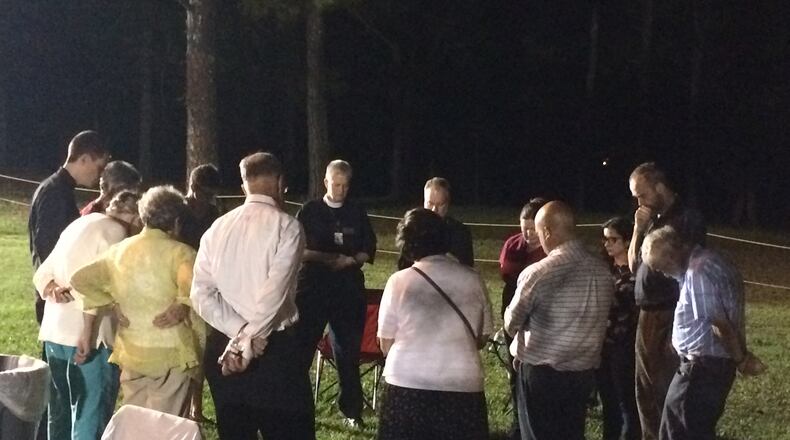A small group of death penalty opponents prayed and hugged each other as John Wayne Conner was placed on a gurney and injected with a deadly dose of pentobarbital just after midnight Friday morning, becoming the sixth man Georgia has put to death this year.
The 60-year-old was pronounced dead at 12:29 a.m., 34 years and a day after he was convicted in Telfair County of murdering a drinking buddy, 29-year-old J.T. White.
He declined to make a final statement and rejected the offer of a prayer.
Conner ate his last meal of fried fish, hush puppies and two deluxe hamburgers on Thursday after spending several hours with three relatives, three friends, two members of the clergy and four from his legal team. At 3 p.m. he was given a physical and then his wait began.
The execution was slated for 7 p.m. Thursday, but appeals were still ongoing.
About 50 people — Conner’s friends and relatives, as well as strangers to him — started a vigil at the entrance to the prison property, about a mile from the death chamber in a cinder-block building behind the Georgia Diagnostic and Classification Prison. By the time demonstrators at the prison received word at about 11:45 p.m. Thursday that their prayers were not answered, only 14 remained.
One member of the U.S. Supreme Court, Justice Stephen Breyer, disagreed with his colleagues’ decision minutes before midnight to reject Conner’s request for a stay and to hear his appeal. Breyer wrote in his dissent that he would have granted Conner’s request.
A federal court rejected an appeal from Conner's legal team Thursday afternoon; the Georgia Supreme Court said no to mercy Thursday morning; and the State Board of Pardons and Paroles denied clemency on Wednesday.
Some demonstrators outside the prison wondered about the lack of public interest in the increasing number of executions Georgia is scheduling.
A woman who described herself as a family member buried her face in a relative’s chest Thursday evening, sobbing, while others in the group recounted stories about Conner. Twenty minutes after the scheduled 7 p.m. execution hour, she and the man got into their car and drove away.
Inside the roped-off area for demonstrators, one by one those in the circle read the names of the 42 others who have been executed in Georgia over the past 40 years.
Mary Catherine Johnston mourned the increasing frequency of executions in Georgia even as the public’s interest in them seems to wane.
“If it’s a case that’s not high profile, you can’t get people out. I’ve been out here (for other executions) when it’s just me and two other people. … I think the people want to forget about them,” Johnston said.
“They don’t care,” deacon Dick Tolcher, who heads the prison ministry program for the Catholic Archdiocese of Atlanta, said of the public’s attention when an execution is carried out. “I believe every man has human dignity. I believe only God is the author of life and death.”
Conner, then 25, and White had spent the evening of Jan. 9, 1982, at a party but wanted to keep drinking once they returned to Conner’s house in Milan.
They walked to a neighbor’s house in search of a ride to the liquor store, but the neighbor refused.
Walking back to Conner’s house, the drunken men got into a fight because White said he wanted to have sex with Conner’s girlfriend, Beverly Bates. Conner beat White with a quart bottle and an oak tree branch.
Conner quickly went home to get Bates. On their way out of town, though, Conner stopped at the ditch where he had left White to make sure White was dead. Conner beat him with a tree limb and then stabbed him with a stick.
Conner and Bates were arrested the next day in Butts County, on their way to Gainesville.
In an appearance before the State Board of Pardons and Paroles on Wednesday, lawyers and Conner's relatives who fought to save him focused on the extreme poverty and violence of his childhood. His father was to blame, they said.
“Imagine a man who evokes fear and repugnance from an entire community,” Conner’s clemency petition said regarding Conner’s father.
The petition said Conner's father slit a man's throat after the man brushed against the arm of his pregnant wife. They also said the elder Conner, while serving overseas during World War II, beheaded a man in a movie theater for sitting in the seat between him and his brother. The petition said Conner's father stabbed his brother and father-in-law, sexually assaulted his daughters and cut up his wife "like a jigsaw puzzle."
But the Parole Board also heard from District Attorney Timothy Vaughn, chief prosecutor in Telfair County, who argued that John Wayne Conner was as violent as his father.
Conner was 15 in 1971 when he was convicted of manslaughter for fatally shooting another teenager, Randy Smith. Conner spent 15 months in a juvenile facility for that crime.
On May 3, 1981, he cut Jesse Wayne Smyth’s throat, put the body in the trunk of Smyth’s car and drove the car into a river. For nine months, no one knew where Smyth was until one of Conner’s brothers told police what had happened. By then Conner was in jail, awaiting trial for White’s murder.
After he was convicted on July 14, 1982, of murdering White, Conner pleaded guilty to Smyth’s murder.
“He killed three people in 10 years,” Vaughn said.
About the Author
The Latest
Featured


